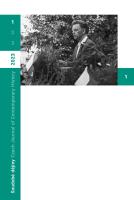Dcera, historička, "špionka" Sheila Fitzpatricková
Daughter, Historian and "Spy" Sheila Fitzpatrick
Over the Memoirs of the "Other" Revisionist
Author(s): Jan AdamecSubject(s): History, Cultural history, History of ideas, Political history, Post-War period (1950 - 1989), History of Communism, Historical revisionism
Published by: AV ČR - Akademie věd České republiky - Ústav pro soudobé dějiny
Keywords: Sheila Fitzpatrick;Soviet studies;historical revisionism;soviet Union;communism;Stalinism;Moscow;Australia;Cold War;Soviet archives;memoirs
Summary/Abstract: In the first part of his essay dedicated to the Australian historian Sheila Fitzpatrick, a world-renowned expert in the field of Soviet studies, the author presents the beginnings of her academic career. He makes ample use of her self-reflections from several decades’ distance in the form of autobiographical publications, particularly "A Spy in the Archives: A Memoir of Cold War Russia" (Melbourne, Melbourne University Press 2013), which he supplements and contrasts with other secondary sources. What interests him most about Fitzpatrick’s scholarly career is how she became an unorthodox and open-minded representative of the revisionist current in the historiography of Soviet communism, and how her initiatory research experience in Moscow in the late 1960s shaped her. Fitzpatrick was born in 1941 in Melbourne, where she spent her school years and studied history and music at university. Both her father, Brian Charles Fitzpatrick (1905–1965), and her mother, Dorothy Mary Fitzpatrick (née Davis, 1913–2001), were historians and left-wing activists, and the author traces how this family background influenced her and how she positioned herself in relation to it. As a gifted student, thanks to a scholarship, she went on to postgraduate studies at St. Antony’s College, Oxford, from where she headed to the Moscow archives in 1966 on a study exchange. She spent three years there, on and off, culminating in a doctoral thesis on the People’s Commissariat of Enlightenment (Narodnyi komissariat prosveshcheniia) under the direction of Anatoly Lunacharsky (1875–1933). In the context of the Sovietology of the time, burdened with schematic Cold War thinking, the author emphasizes Fitzpatrick’s efforts to understand the Soviet system from the inside, through archival sources. He examines her “survival strategies” in a space defined by the surveillance and pressure of the Soviet authorities and the demands of Western academic institutions and portrays her embeddedness in an intellectual circle of Russian friends in which Lunacharsky’s brother-in-law and secretary, Igor Sats (1903–1980), was a key figure. The author also examines the personal and professional dilemmas associated with the spy-mania of the era on both sides of the Iron Curtain, which the ambitious historian had to deal with.
Journal: Soudobé Dějiny
- Issue Year: XXX/2023
- Issue No: 1
- Page Range: 137-166
- Page Count: 30
- Language: Czech

